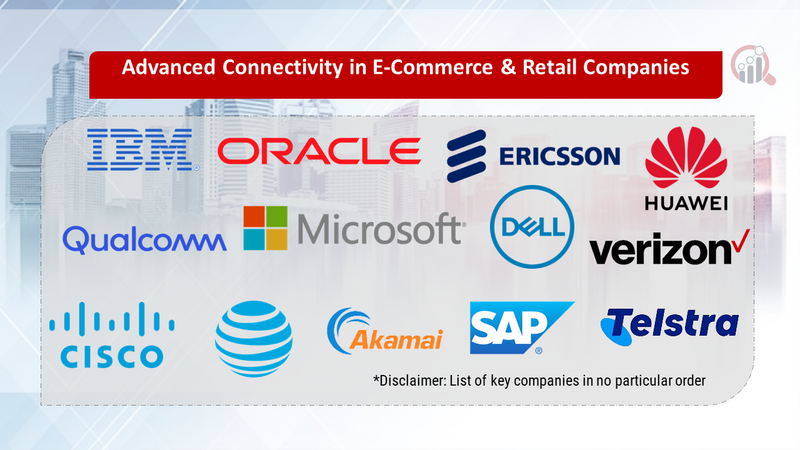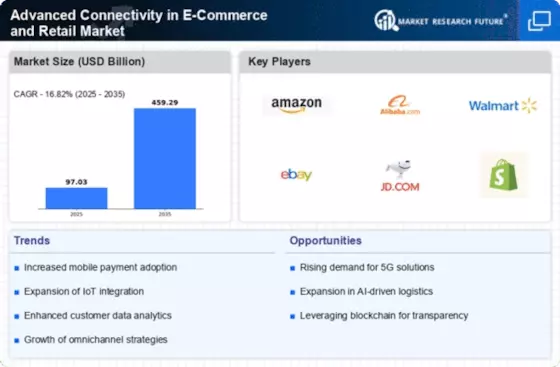Top Industry Leaders in the Advanced Connectivity in E-Commerce and Retail Market

Competitive Landscape of Advanced Connectivity in E-Commerce & Retail Market: A Deep Dive
The e-commerce and retail landscape is undergoing a paradigm shift, driven by the integration of advanced connectivity technologies like the Internet of Things (IoT), artificial intelligence (AI), and cloud computing. This interconnected ecosystem, aptly termed "advanced connectivity," is empowering businesses to reimagine customer experiences, streamline operations, and unlock new avenues for growth.
Key Players:
- AT&T
- Verizon
- Qualcomm
- Ericsson
- Huawei
- Cisco Systems
- IBM
- Oracle
- SAP
- Microsoft
- Samsung
- Dell
- HPE
- Intel
- Juniper Networks
- Akamai Technologies
- NTT
- Vodafone
- Telstra
- Singtel
Strategies Adopted by Market Leaders:
-
Ecosystem Building: Players like Amazon and Microsoft are actively building ecosystems of partners – hardware manufacturers, software developers, and system integrators – to offer end-to-end solutions catering to diverse retail needs.
-
Vertical Focus: Tailoring solutions to specific retail segments, like grocery or fashion, ensures deeper understanding of client requirements and leads to higher adoption rates. For instance, IBM's Food Trust blockchain platform helps track food provenance and ensure safety in the grocery sector.
-
Subscription-Based Models: Shifting from upfront licensing fees to flexible subscription models for software and platform access fosters long-term customer relationships and recurring revenue streams.
Factors for Market Share Analysis:
-
Technology Breadth: Offering a comprehensive suite of interconnected technologies like IoT, AI, and cloud computing under one roof creates a one-stop-shop value proposition for retailers.
-
Industry Expertise: Understanding the nuances of specific retail segments and addressing their unique pain points enables tailored solutions and higher customer satisfaction.
-
Global Reach: Having a robust global presence through data centers, network infrastructure, and partner ecosystems allows players to cater to the geographically dispersed nature of the retail industry.
Emerging Companies and Trends:
-
Hyperlocal Delivery Startups: Companies like Swiggy and DoorDash are leveraging local networks of delivery partners and advanced location intelligence to offer hyper-fast deliveries, transforming last-mile logistics in the e-commerce space.
-
Augmented Reality (AR) and Virtual Reality (VR) Integration: AR/VR solutions are enabling immersive virtual try-on experiences and interactive product visualization, blurring the lines between online and offline shopping.
-
Blockchain for Supply Chain Transparency: Blockchain technology is gaining traction for ensuring transparency and traceability in supply chains, particularly for ethically sourced products or perishable goods.
Current Investment Trends:
-
Vertical SaaS Solutions: Investors are increasingly backing startups offering industry-specific SaaS platforms for areas like inventory management, customer engagement, or omnichannel retailing.
-
Edge Computing: The rise of edge computing solutions that process data closer to devices at the network edge, reducing latency and optimizing performance, is attracting significant investment.
-
Security and Privacy Solutions: As advanced connectivity brings more data into play, cybersecurity and data privacy solutions are becoming crucial for retailers, leading to increased investment in this space.
The future of the advanced connectivity landscape in e-commerce and retail is brimming with possibilities. From hyper-personalized experiences to automated logistics and immersive virtual shopping, the lines between physical and digital worlds will continue to blur. This dynamic and competitive space holds immense potential for businesses that can adapt, innovate, and deliver value through interconnected, data-driven solutions.
Latest Company Updates:
-
December 12, 2023: Amazon Web Services (AWS) announces the launch of AWS IoT FleetWise, a managed service for securely connecting and managing fleets of IoT devices at scale. This could benefit e-commerce and retail companies in tracking inventory and optimizing logistics. -
January 10, 2024: Microsoft Azure unveils the Azure Digital Twins platform, enabling the creation of virtual representations of physical assets and systems. This could be used in e-commerce and retail for simulating store layouts and optimizing product placement.










